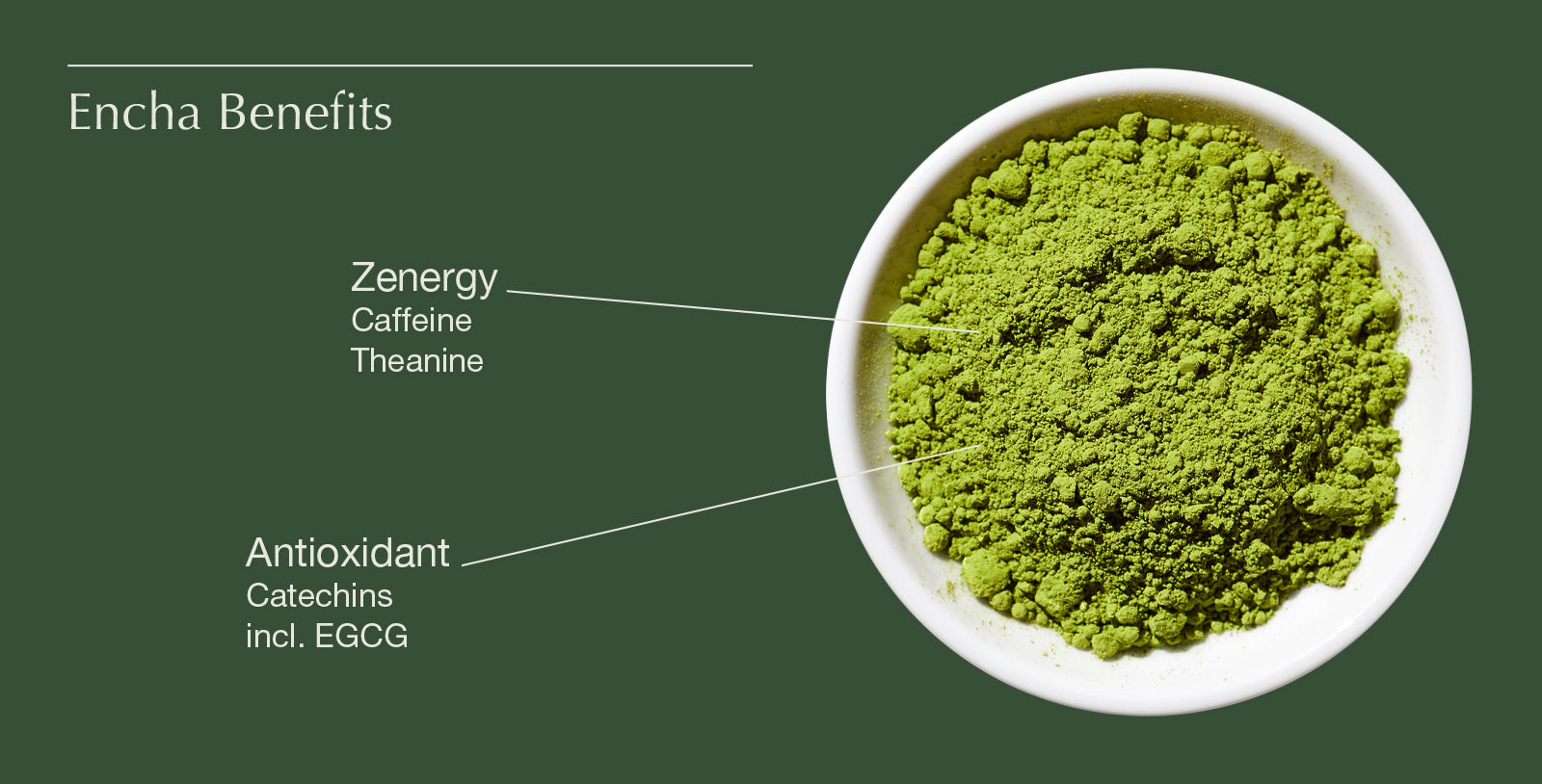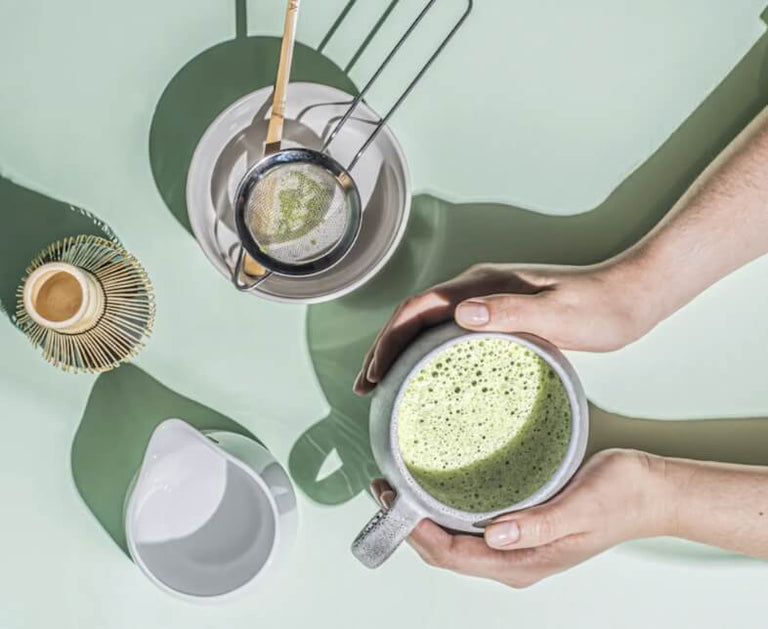Matcha Benefits
Scientific Review and How to Monitor the Health Benefits
Did you know replacing your daily coffee with matcha can offer a number of health benefits? First of all, let’s talk about theanine. Matcha contains caffeine along with theanine, so you get long-lasting energy without the crash.
In the last three weeks before harvest, matcha tea leaves are shaded, allowing them to produce more theanine than green tea leaves as well as building the umami flavor. Theanine calms and centers the mind, while caffeine provides a boost of energy. Say goodbye to jitters and anxiety.
But that’s not all. Matcha offers antioxidant and anti-inflammatory benefits from catechins, including ECGC.

The ABC’s of Encha Organic Matcha
Antioxidant-Rich
Because matcha leaves are ground rather than steeped, you ingest every bit of nutrients, including the powerful antioxidant, catechins, which makes up about 12% of the nutritional content. That’s the same serving of catechins you’d get from TEN cups of brewed green tea.
Better Taste
If you were to taste the leaves, matcha tastes softer and smoother than classic green tea because the stems are removed in processing. The higher theanine also softens the flavor and adds umami.
Calming & Energizing
Matcha has more theanine than regular green tea because matcha plants are shade-grown for about three weeks before the harvest. Theanine, also referred to as L-theanine, is an amino acid that helps kickstart alpha-frequency brain waves, which induce a state of wakeful calmness.
Two Main Health Benefits of Matcha
1. Matcha Zenergy from Theanine + Caffeine
The magical benefit in matcha is its unique combination of mentally calming theanine (L-theanine) and moderate caffeine. Theanine, also spelled as L-theanine, is an amino acid that helps induce alpha-frequency brain wave which is a state of wakeful calmness, as opposed to anxiety or drowsiness.
Many people feel mental alertness without jitter and longer mental focus without crash from drinking Encha. Coffee doesn’t contain theanine. That’s the key difference for matcha vs coffee. Regular tea leaves don’t have enough theanine because they didn’t go through shaded growth in the last 3 weeks before harvest.
When Encha organic matcha plants are shaded for about 3 weeks before harvest, the plants grow more theanine and caffeine.
Guide for Monitoring Zenergy from Drinking Encha Organic Matcha
Tea drinkers: Start each morning with a cup of Encha at breakfast. Try another serving after lunch if needed.
Light coffee drinkers (1-2 cups a day): Try replacing coffee with Encha for one week. Drink Encha when you would drink coffee.
Heavy coffee drinkers (3+ cups a day): Try replacing coffee with Encha for one week. You may experience withdrawal headache in the first few days.
Scientific Review of Matcha Benefits for Focus and Attention
A 2017 review article published in Phytomedicine analyzed 21 studies and identified positive associations between the combination of theanine and caffeine in green tea and such cognitive benefits as attention and memory, for example, activation of working memory revealed in functional MRI.
A 2017 study published in Food Research International had 23 participants drink matcha tea, eat matcha bar or had placebo tea or bar. Basic attention capabilities and psychomotor speed in stimulus response were improved with the intake of matcha compared to placebo groups. The effect was more evident after drinking matcha tea than eating a matcha bar.
A 2014 review article published in Nutrition Reviews analyzed data from 11 studies and showed that participants reported both the feeling of alertness and feeling of calmness after the intake of caffeine and theanine and performed more accurately in cognitive tasks of identifying or searching objects.
A 2009 study published in Brain Topography found that intake of L-theanine helped the participants sustain attention in a highly demanding visuo-spatial attention task.
A 2008 study published in Nutritional Neuroscience found that the combination of L-theanine and caffeine improved both speed and accuracy in participants’ attention-switching tasks.
2. Matcha Antioxidant Catechins (including EGCG)
Antioxidant is a general word describing the molecules that prevent free radicals from oxidating human cells. Oxidation underlies aging and many diseases including cancer. There are many kinds of antioxidants.
A powerful group of antioxidants, named Catechins, is abundant in natural green tea leaves, hence in whole-leaf ground-up matcha powder. The most active and abundant catechin is Epigallocatechin gallate (EGCG). All three grades of Encha Organic Matcha have the same amount of Catechins.
Guide for Monitoring Antioxidant and Anti-Inflammatory Benefits from Drinking Encha
Skin: Take weekly pictures of your face without any makeup in the same lighting. In 2-3 months after daily drinking of Encha, you might see smoother and brighter skin because antioxidant Catechins help reduce UV damage and are anti-inflammatory.
Metabolism: All other things equal, drinking Encha daily should stimulate metabolism and help weight management. Also do not skip breakfast when you drink your morning Encha because it stimulates your digestive system. Instead, go light on your dinner.
Immunity and disease prevention: Monitor your health measures and see how your general immunity and specific health measures might be improved.
Scientific Review of Matcha Antioxidant and Anti-inflammatory Benefits
Skin: A 2019 review article published in Nutrients identified that catechins helped reduce UV damage, increase the level of collagen and elastin fibers, and reduce the expression of collagen-degrading MMP-3 enzymes.
Skin: A 2013 study published in British Journal of Nutrition found after 12 weeks of intake of catechins, human skin showed catechin metabolites and one form of reduced damage from UV radiation.
Fat management: A 2018 article published in Nutrition Research conducted a pooled data analysis from six human trials of 921 participants. The analysis identified that after 12 weeks of daily intake of catechins, the participants’ abdominal fat area, visceral fat area and subcutaneous fat area were reduced. Their blood pressure improved.
Fat management: A 2007 article published in Journal of Nutritional Biochemistry identified from in vitro studies that catechins, particularly EGCG, inhibit the intestinal absorption of dietary lipids.
Cancer prevention or amelioration: A summary article on National Cancer Institute website provides a comprehensive reading. The antioxidant property of catechins may inhibit tumor cell proliferation. The article mentions that some studies “have linked tea consumption to reduced risks of cancers of the colon, breast, ovary, prostate, and lung”.
Heart disease prevention: A 2008 article in Current Medicinal Chemistry thoroughly reviewed epidemiological, clinical and experimental evidence. Catechins exert vascular protective effects through multiple mechanisms, including antioxidative, anti-hypertensive, anti-inflammatory, anti-proliferative, anti-thrombogenic, and lipid lowering effects (lowering LDL).
Anti-inflammatory effects: A 2017 study published in Toxicology and Applied Pharmacology found that catechins, specifically EGCG, effectively inhibited the production of pro-inflammatory neural mediators (IL-6 and IL-8), and expression of Cox-2 in primary human rheumatoid arthritis synovial fibroblasts.
Anti-inflammatory effects: A 2017 article published in Molecules identified multiple molecular mechanisms and neural pathways in which catechins inhibit excessive oxidative stress and exert anti-inflammatory effects, particularly in relation to the digestive system.
Information on Encha site and products is NOT medical advice. You should obtain medical advice from a licensed health care professional. If you experience any adverse effects from drinking Encha, you should stop right away. See Encha Terms and Conditions for full details.

